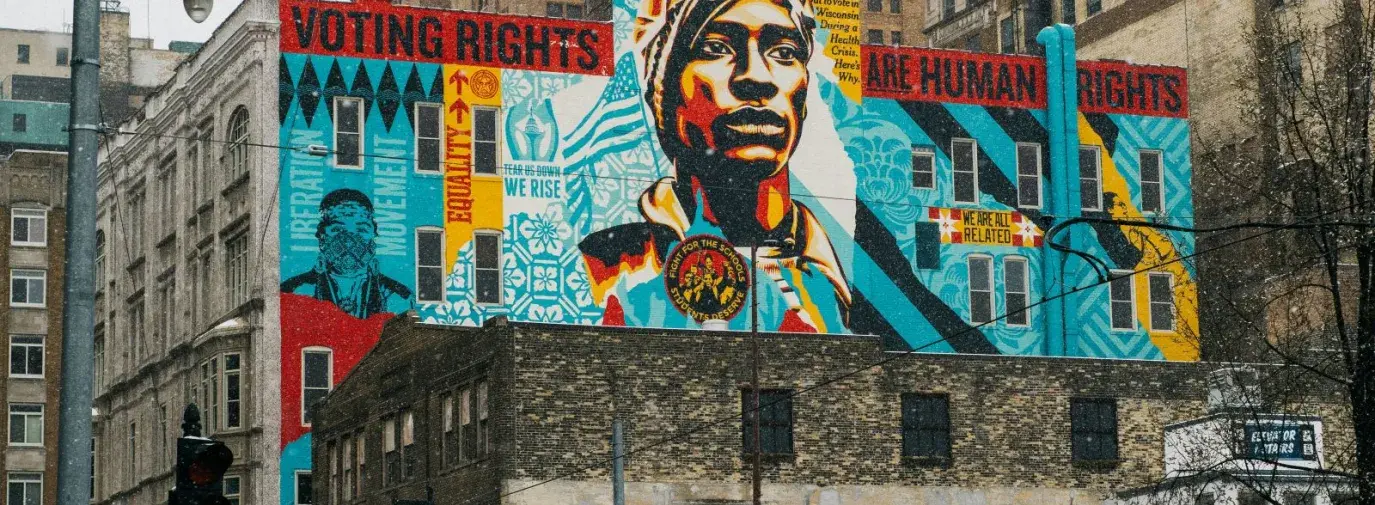
On the evening of June 12, 1963, civil rights activist Medgar Evers pulled into his driveway in Jackson, Mississippi with a box of T-shirts printed with the slogan “Jim Crow Must Go.” The shirts referred to his work to overturn such Jim Crow-era laws as charging poll taxes, imposing literacy tests, or lifetime voting bans for those convicted of a felony that had suppressed Black voters in Mississippi for generations. Before Evers reached his front door that night, an assassin shot him through the heart, and he died within the hour after being refused at the hospital because he was Black. While Evers did not live to see the passage of the 24th amendment to the Constitution in 1964, or the passage of the Voting Rights Act of 1965, the outlawing of poll taxes, literacy tests, and other voter-supression tactics led to massive increases in voter registration in the Black community, a priority of Evers’ life’s work.

At the same time. Mississippi’s lifetime ban on voting by convicted felons persisted until just last year, when it was struck down by the US Court of Appeals—and voter suppression of incarcerated or formerly incarcerated people remains to this day in all but two states. This ongoing voter-suppression tactic, alongside others, such as restrictive voter-ID laws, demonstrates how, despite the progress made in the 60 years since Evers’ murder, there remains work to do to ensure voting in the United States truly reflects the will of the people. The suggestions presented in this article provide ways to strengthen our voting rights, by addressing ongoing systemic issues within the US electoral system.
Voting is Not Equitable
Voter suppression is nothing new, but it has become “more sophisticated and targeted,” as Virginia Kase Solomón, President and CEO of the watchdog nonprofit Common Cause has said. Officials employ several tactics, including but not limited to registration restrictions, felony disenfranchisement, and strict voter ID laws, requiring physical travel and expenses to obtain the required government-issued identification.
There are also subtler tactics, as Solomón explains: “We want to create more access and vote by mail, but we are constantly fighting back against signature matching requirements. And if you think about people who are older or people living with disabilities, they can literally eliminate the ballot if the signature doesn’t match.”
Voter suppression, further, predominantly affects voters of color, and always has. Take felony disenfranchisement, for example—in the US, Black men are incarcerated at four times that of their white counterparts, while Indigenous and Latinx people are imprisoned at 4.2 and 2.4 times the rate of whites, respectively, according to a 2022 study by the Bureau of Justice Statistics. Moreover, strict voter ID laws disproportionately affect transgender and gender-nonconforming people if their identification does not match their gender and because it can be difficult for this community to obtain accurate and accepted ID. People in low-income and rural areas, people with disabilities, and the elderly struggle with physical access to voting, like the aforementioned signature verification, or a lack of access to polling locations and accessible voting machines, highlighting the need to protect less restrictive mail-in ballots.
Legislation like the Freedom to Vote Act, reintroduced last summer by Rep. John Sarbanes (D, MD) seeks to fix these and other voter-suppression issues. The Act would require states to alert voters about signature verification discrepancies and provide a chance to fix them. It would make Election Day a federal holiday, expanding working voters’ access to the polls, and would enshrine the right of formerly incarcerated citizens to vote, among other provisions.
Additionally, you can follow in the footsteps of those like Evers’ and engage in efforts prioritizing voter registration, especially of marginalized communities or those who may not have a consistent history of voting. You can double-check your registration and help others check theirs (and find their polling places) at iwillvote.com.
Time to Put an End to Gerrymandering
The systemic racism seen in various voter suppression tactics rears its head again in racial gerrymandering, or the manipulation of redistricting. “Packing and cracking” are terms voting-rights activists use to describe the two most common techniques of gerrymandering. The first involves drawing maps to put certain types of voters into as few districts as possible, minimizing the number of preferred candidates they might elect. “Cracking,” on the other hand, is the opposite: splitting up voters with similar characteristics across multiple districts to weaken their overall collective power. Both techniques have been used to target communities of color, specifically, and lessen their power as a voting bloc.
In 2018, the Supreme Court dealt a blow to the anti-gerrymandering movement by ruling in Rucho v. Common Cause that while partisan gerrymandering may be “incompatible with democratic principles,” federal courts ultimately could not review these allegations. Solomón further says: “It turned on the green light for racial gerrymandering and made lawsuits challenging racial redistricting more complicated by disguising it as political.” Currently, there are 53 active redistricting litigation cases, according to The American Redistricting Project.
The John Lewis Voting Rights Advancement Act, if passed, will mandate federal approval of all changes related to voting in jurisdictions with a history of discriminatory voter suppression. The Act, reintroduced by Rep. Sewell, Terri A. (D, AL), would also strengthen other areas of the original Voting Rights Act like ending discriminatory voter ID laws and ensuring multi-lingual voting materials.
It’s All About Popular
Ensuring the right and access to voting for all is critical and is only one step toward improving voter-equity in the United States. The use of the Electoral College in Presidential elections reinforces this country’s history with systemic racism and the institution of slavery. When writing the Constitution, delegates from slaveholding states bristled at the idea of a national popular vote for President because enslaved people within their borders were denied the vote—diminishing the size of their electorate compared to free states. Thus, the Electoral College was born. Some defend the Electoral College on states-rights grounds, arguing that it helps less populated states have equal representation to more populated states, but this, as Solomón says, is a fallacy.
“The reality is that the minority should not be able to suppress the will of the majority,” she states. “But twice in the past 20 years, the will of the majority has been suppressed and the presidential candidate who won the popular vote lost the election. What ends up happening is that candidates running for office are courting Electoral votes, not individual ones.”

While there have been numerous attempts at abolishing the Electoral College outright, with the most near successful in 1979 (it failed in a 51-48 Senate vote), Common Cause is advocating for, at the very least, a compromise. The National Popular Vote Interstate Compact (NPVIC) is an agreement among states and the District of Columbia to award all electoral votes to whoever wins the popular vote. So far, 16 states and DC have adopted the NPVIC, amounting to 205 electoral votes. For the compact to have legal force, it needs to reach the threshold of 270 votes, which is the absolute majority in the Electoral College. In a system where many feel their vote doesn’t matter, or is taken away from them, this would put the power back into the people’s hands.
Your Vote is Your Power
Green America urges all of its members to become fully engaged in our democracy, which depends on our participation in everything from attending informational town halls to contacting your elected officials and volunteering with voter registration drives. Find “get out the vote” resources inside the front cover of this magazine. Voting is an important way we all can have a say in our country’s future—it represents each individual’s voice and power.
For example, consider this year’s primary season. Even without a competitive primary on either side of the 2024 presidential election, voters have found effective and historic ways to make their voices heard. As this magazine went to press, multiple state primaries were considerably impacted by campaigns urging Democrats to cast votes for “Uncommitted,” or “No Preference,” write-ins, and similar stances to signal their disapproval of President Biden’s handling of what the International Court of Justice has termed “a plausible genocide” in Gaza. At press time, “Uncommitted” voters had earned 27 delegates to send to the Democratic National Convention. On the Republican side, even more voters—1 in 5—did not vote for the leading candidate, Donald Trump. These efforts demontrate how voting can be used to communicate why candidates haven’t earned voters’ support and that voters aren't afraid to take a stand.
Activists like Evers fought and died for the right to vote and by encouraging everyone to engage in different methods of voter resilience, we can honor their sacrifices. This is especially meaningful at a time when voter suppression efforts are using such tactics as eliminating polling places and ballot drop-off boxes, initiating AI-generated disinformation campaigns, and even passing state and local laws curtailing rights to civil assembly and public protest.
What’s at stake is our ability to collectively “radically reimagining what’s possible,” as Solomón says, whether it’s the investment of public funds into green energy sources and distribution networks, labor protections that prioritize people over profits, or equitable access to safe housing amidst a changing climate. Protecting our democracy and ability to build a just future is an immense task, and we can’t achieve it alone. Evers was one of thousands who gave their blood, sweat, tears, and for some, their lives, to ensure everyone had the right and access to vote. It is imperative we continue that work.
In a world where our system works for the people, where we all have the ability and encouragement to vote authentically, our votes could change the world.
Questions to ask candidates:
- Do you support elimination of voter-suppression tactics as outlined in the Freedom to Vote Act?
- Do you support protection of voting rights as outlined in the John Lewis Voting Rights Advancement Act?
- Do you support a popular vote for President, which can be achieved through adoption of the National Popular Vote Interstate Compact?
- Do you support the Inclusive Democracy Act, sponsored in the Senate by Peter Welch (D, VT) and in the House by Ayanna Pressley (D, MA), which would end felony disenfranchisement?







